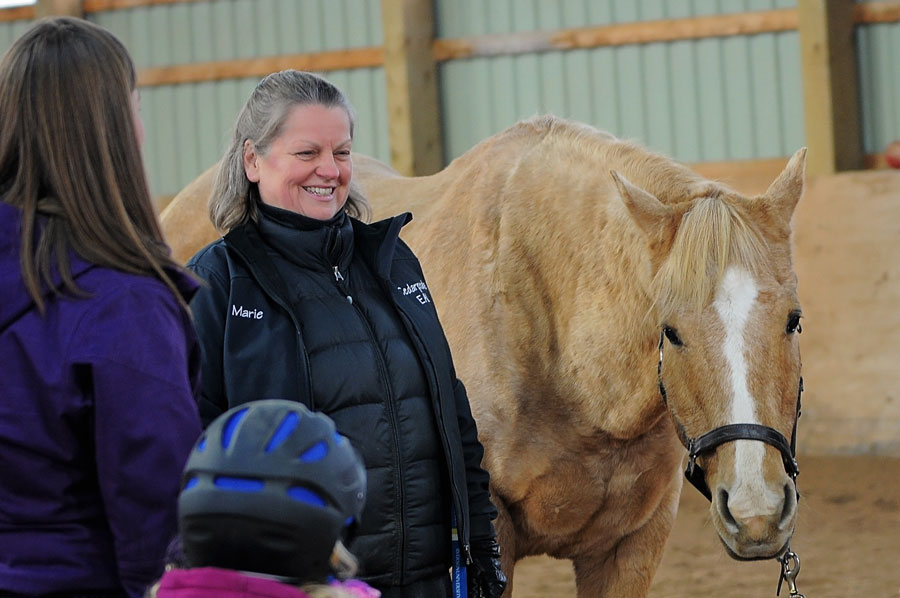LORETTO – Equine assisted learning can boost self-esteem, strengthen communication skills, increase awareness and improve mental health.
And two groups of Black and 2SLGBTQIA+ students in Grades 7 through 12 at the Upper Grand District School Board (UGDSB) will have an opportunity to reap these benefits this summer.
The board is using Summer Mental Health Funding from the Ministry of Education to connect students to equine assisted learning sessions.
Ellen Downey from TUFF Therapeutic Riding Foundation and Marie Hodgson from Cedarpeaks Equine Assisted Learning are collaborating to offer two sessions to UGDSB students, which will both take place at Jewelview farm in Loretto.
The sessions are open, free of charge, to students currently receiving support from UGDSB mental health staff. Transportation will also be provided.
The first session is a “culturally responsive program” for Black students and runs from July 16 to 18.
“This group will focus on elevating and affirming the voices of our Black students,” UGDSB officials state.
“Students will … identify their strengths, affirm each other, be heard and focus on mental health and wellness.”
The second session is an “identity affirming program” for 2SLGBTQIA+ students and runs from Aug. 20 to 22.
“This group will welcome and support students to identify their strengths and focus on mental health and wellness,” board officials state.
Students in each group will spend three full days on the farm, from 9am to 3pm.
The programs do not involve horse riding, but working with horses from the ground.
Finding their voice
The focus of each session, Hodgson told the Advertiser, is helping students find their voice in the community.
The board offered similar sessions last year for Black and Indigenous students.
Hodgson said students from a wide range of backgrounds attended – some with experience with horses, and others who’d never spent time on a farm or around large animals.
The program is based on the students working corroboratively in teams of three to five people to guide a horse through different tasks.
“Ultimately what ends up happening is the horses will mirror the way the children are collaborating or communicating with them,” she said.
“The horses are giving them back an image of the way they are interacting with each other and with the horse.”
When a group struggles to guide their horse through a task, Hodgson said the facilitators try not to “give them answers, but guide them to their own answers.”
This teaches the students that when it feels like someone isn’t listening to them or doing as they’ve asked, it can be helpful to try asking in a different way, Hodgson explained.
Non-judgmental
And horses can teach these lessons in a way that is “so non-judgmental,” she added.
“They don’t care if you’re Black, if you’re white, if you’re gay. You are just their person.

Submitted photos
“We’ve been told by participants it’s the only place they come where they don’t feel judged.
“The horses don’t care what they look like or what they smell like. If they are kind and responsive to the horses’ needs, there is nothing the horse will reject.
“And I think that in itself – no matter what the reason is that the kids are coming to us – just being 100 per cent accepted by these magical creatures,” is what makes the program so powerful.
“It really is magic when you watch these children and youth sort of flourishing in this environment.
Why horses?
She said people often ask why horses are used in this kind of program instead of other animals.
“I think the short answer is that horses are very intuitive creatures.
“They are flight animals so they are very interactive with their environment and what is going on around them.
“So what the children bring to them, they will react accordingly: if the energy is high the horses’ energy will be very high; if they are calm, the horses tend to be calm.”
Hodgson said spending time around the horses often helps the students feel calmer.
“If they are feeling stressed or anxious, once they’ve interacted and found their place with the horses, they [often] feel less anxious,” she said.
“Ellen and I will ask the kids how they are feeling when they first get there, and its almost always different from the end of the program.”
She said the horses often help the students gain clarity about their own feelings.
And last year, she said by the end of the three-day program the students didn’t want to leave.
“They didn’t want to get on the bus – that’s how strongly they felt about being with their horses,” she said.




